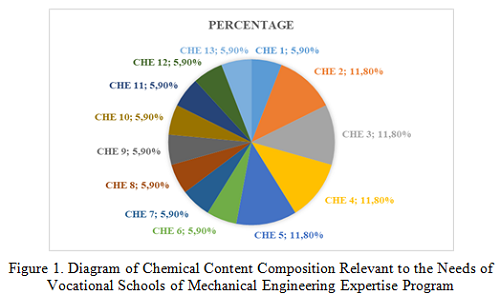Reconstruction of Chemistry Curriculum Elements of Vocational School (SMK) of Mechanical Engineering Study Program
DOI:
https://doi.org/10.31258/jes.5.4.p.622-637Keywords:
Reconstruction, Curriculum, Chemistry, SMK, Mechanical EngineeringAbstract
To support the productive subject of expertise field, chemistry curriculum elements and materials in SMK need to be reconstructed. This study aims to produce an integrated chemistry syllabus of Mechanical Engineering in SMK. This study uses a development research method with research subjects: 2 chemistry education experts, 6 chemistry teachers, 4 productive teachers and 2 vice curriculum principals at SMKN Bandung. The results show the relevant chemistry KD to the Mechanical Engineering KD includes knowledge and skill competencies: explaining, describing, applying, determining, identifying, classifying, analyzing, constructing, proposing ideas, designing and conducting experiments. The compositions of chemical content that is relevant are types, physical and chemical properties, symbols, roles, handling of hazardous chemicals, and standard chemical safety and security in the work environment (5.9%), redox reactions (11, 8%), electrochemistry (11.8%), thermochemistry (11.8%), physical and chemical properties of metals, pure metals and alloys (11.8%), electron configurations and the periodic system (5.9%), bonding chemical (5.9%), corrosion (5.9%), metallurgy (5.9%), hydrocarbons (5.9%), petroleum (5.9%), polymers (5.9%), and reaction rate affecting factors (5.9%). The learning strategy is a scientific approach of discovery learning, project-based learning, problem-based learning, and guided inquiry. The evaluation results are the competence of knowledge, skills and attitudes assessment.
Downloads

Downloads
Published
Issue
Section
License

This work is licensed under a Creative Commons Attribution-NonCommercial-ShareAlike 4.0 International License.











